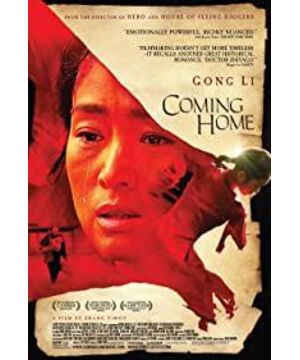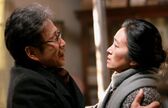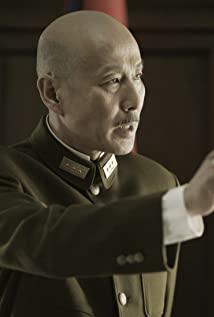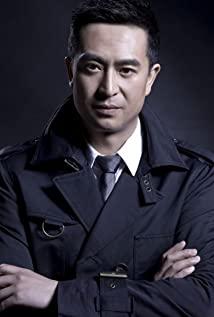At the same time, my cousin was watching "Return" in a cinema in Hangzhou, and when the screen shouted "Master Fang", the audience burst into laughter. The post-90s girls complained one after another, believing that it was a big regret of the movie that Mr. Fang, the laughing character, did not appear in the movie, and suggested that the movie be changed to "Sad reminder of an old man chasing his wife", or "The 5th of that month that year".
I'm not surprised to hear my cousin say that. I don't think the laughter is the director's failure. Cry, or laugh, depending on the distance between the audience and the event. I even think the genius of this movie is that its emotions are often between crying and laughing.
Less than one-tenth of the story of the original novel "Lu Criminal Yanshi" is left in the movie. The screenwriter cut off the American story, the Shanghai story, and the Chongqing story, and compressed the long farm labor camp into a short beginning. In the original work, the charm and scheming of the old Shanghai women are gone, the overt or covert battles in the academic world are gone, and the horrific torture on the farm is gone.
The screenwriter focuses on the post-1976 period, replacing the complex interpersonal relationships in the original book with a simple family of three, and omitting the chattering market calculations, amplifying the flexible and stable emotions in the original book as much as possible. They concentrated on only making the stories of these three people, and only made dense weaving around "acquaintance". It's as if they just took a young branch off a big tree, put it in a new place, watered it and fertilized it, and let it grow slowly.
A husband wants to make his amnesiac wife recognize him, and he does everything he can. Since these "methods" are not in the original work, we would rather say that the screenwriters have tried their best.
He pretended to write a letter saying that he was coming back on the 5th and asked his wife to pick him up at the station. He heard his wife call to find a worker, and he spent the night looking for books and tools to learn how to tune the piano, and came to play a familiar song. He bundled the scribbled letters into the mail, panted to help her carry them upstairs, and unpacked them for identification. He tried to reconcile the relationship between mother and daughter, and wrote this gentle advice into a letter and read it to his wife. Yan Shi's ideas were too clever, even a little cunning. He pretends to be this way and that, and we can't help laughing at his cuteness.
For a wife who lost her memory, Yan Shi came home not from her husband, but from a strange guest, from a piano repairer, from Master Fang, from a person who read the letter... She was sometimes polite. He served tea and water, sometimes screaming and scrambling. You can laugh - it's ridiculous, you don't even know your own husband! You can cry too - it's ridiculous, you don't even know your husband!
There is no strict right or wrong to cry or laugh.
Yan Shi walked down the overpass of the train station again and again, and his eyes were full of hope. He tidied his hair and tied the scarf around his neck, trying to pretend to be a passenger arriving that day. It pretends to be a little solemn and a little funny. I couldn't help but smile. He passed by with his wife, who still didn't know him. My laughter suddenly fell to the bottom and turned into a sigh.
Chen Daoming's acting skills are particularly outstanding in many falls. At the station, he brushes her shoulders, and at the piano, she pulls away from her embrace and punches him hard. You see how his eyes changed from sincerity, hope, surprise, touch, and suddenly to a black hole of despair!
But he is invincible. Every time he came up with a new idea, the steps were brisk, even shoulders and fingers brisk. He was radiant in his black jacket.
Looking at Lu Yanshi, I often laugh. Where does this smile come from? From the reverence for this great man, the great reward for his never giving up a ray of hope and his repeated defeats.
Lu Yanshi's daughter confessed to him: "Many years ago, I told the station to arrest you."
He smiled and said that I had known it for a long time.
We can imagine countless soap operas that would make father and daughter cry. But Lu Yanshi didn't. At this ridiculous time, laughing was much taller than crying.
The director kept the person "Master Fang" secret. In the novel, it is clearly written that Wan Yu begged people to change Yan Shi from the death penalty to a suspended death sentence, and was finally forced to use her body as an exchange for her husband's commutation. The plot in the novel is bloody and not funny at all. In the movie, a curved pen was used, and she only called out to the hallucinated "Master Fang": "Yan Shi has changed to a reprieve, you go out!" This important plot prompt was quickly torn up and resisted by her nervousness. Covered, the audience can easily ignore this line, and then be tossed by her crazy look.
The director should be so secretive on purpose, he wants to highlight a kind of absurdity. He wanted to say, in fact, Yan Shi in the film may not really know what Master Fang did to his wife, let alone the audience? Yan Shi took a copper spoon to seek revenge against Master Fang, and the audience laughed. Intellectuals are a bit roundabout seriously. If someone beats your daughter-in-law with a spoon, you really want to take a spoon to take revenge, so you can't take another one?
Crying and laughing in this thought. If you don't know who Master Fang is, you may laugh. If you instantly understood who Master Fang was, you would think that even Yan Shi was kept in the dark, thinking that all the sufferings suffered by his wife could be revenge with a copper spoon. You really want to cry over this absurdity!
Life is often not a tragedy, nor a comedy, but an absurd drama between crying and laughing.
In the middle of the film, I hope again and again that the wife will recognize the husband. Near the end, I changed my mind. I beg the director to never let them know each other again. I am afraid that the festive reunion will dilute the already very rich absurdity.
Lu Yanshi, homophonic "Nong Yanshi", in Shanghai dialect means "Can you recognize me?"
I have been able to accept the absurdity of "the person who loves each other the most, will never recognize each other for life". Lu Yanshi has also accepted. He stopped trying to make her recognize him. Just being with her is enough.
They were very old, and she put her eyes close to the writing on the wall: "No. 5 meets Yanshi." He helped her lay the bedding on the seat, accompanied her to the station, and held up the sign "Lu Yanshi" . It seemed so futile and so tenacious. It's a no-brainer for them, but it's the best thing to do.
Only a wife who regards her husband's return as the most sacred thing will go to the railway station to wait for her husband day after day in the wind and snow.
Only a husband who regards accompanying his wife as his only dream in life will ride a rickshaw and hold his name tag to pick him up.
Things that ordinary people find ridiculous, only they can do.
In their eyes, this is persistence, but in the eyes of outsiders, it is stupid and nerve-wracking. Maybe the crowd at the station will chuckle. But it doesn't matter at all.
In the desolate Gobi desert where prisoners of labor reform are serving their sentences, a pony is born, which is the spring in Lu Yanshi's eyes. And now, accompanied by Wan Yu, is spring.
In the past ten years, Zhang Yimou seems to be pulling a string, so tight and stubborn. He can't wait to highlight his aesthetic concepts with strong color contrast, and deliberately convey his inseparable views and propositions through bright themes.
And this time Zhang Yimou is neither domineering nor showing off. He relaxed and threw away the complicated dazzling tricks. He prefers to spread the shots in smooth compositions and muted colors. In the subtlety of crying and laughing, he is expressing more complex emotions than his works of the past decade. This mix of crying and laughing is always chewy.
View more about Coming Home reviews











